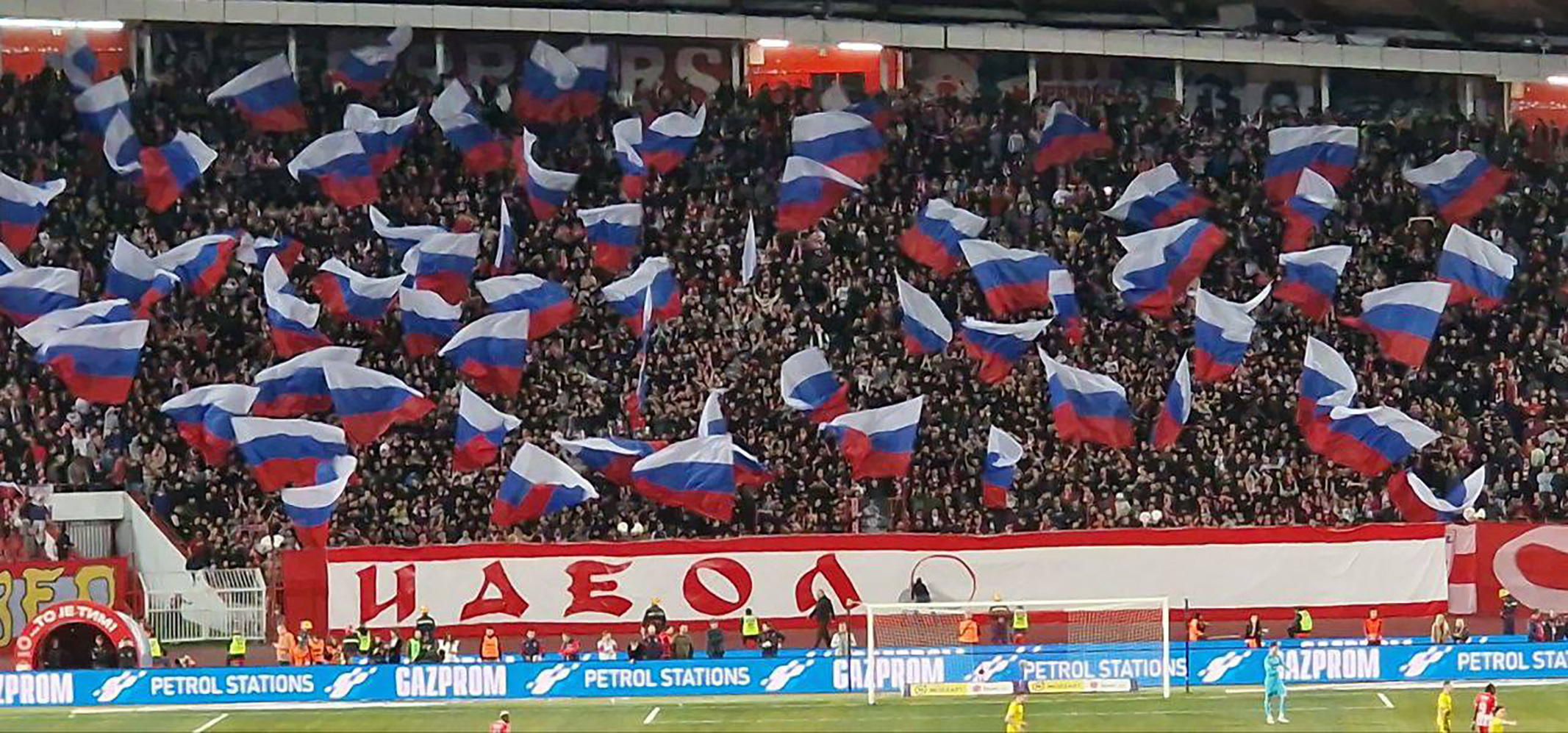The recent display of Russian flags by Red Star Belgrade fans at a Serbian league match goes beyond mere sports enthusiasm, revealing the interesting interplay of football fandom, political influence, and historical undercurrents in Serbia. This act is not merely an isolated show of geopolitical sympathy but a significant chapter in the ongoing narrative of Serbian football fan groups’ involvement in political and nationalistic demonstrations, potentially orchestrated by Serbian intelligence.
This incident is just one example of pro-Russian activism among Serbian hooligans. Their choreography, which depicted a cemetery in the colors of the Ukrainian flag before the Russian invasion, along with their support for controversial national figures, highlights a longstanding affinity for Russia.
The culture of football fandom in Serbia, especially among groups like Red Star’s “Delije” and Partizan Belgrade’s “Grobari,” embodies a broader socio-political phenomenon of a deeply criminalized society. These groups have historically gone beyond their roles as mere supporters of football clubs and Serbia’s national team. They have a very important place in the Serbian intelligence strategies.
The roots of this complex relationship can be traced back to the disintegration of socialist Yugoslavia, when football stadiums became stages for the expression and amplification of emerging nationalistic sentiments and inter-ethnic tensions, especially during matches between teams from different Yugoslav republics. The notorious 1990 match between Red Star Belgrade and Dinamo Zagreb in Zagreb, which escalated into violence, symbolizes the entanglement of football with the political and social unrest leading up to the Yugoslav Wars. James Montague, in his piece for CNN, listed this match among the five football matches that significantly impacted the world.
The participation of football fan groups in the subsequent wars, including their ties to paramilitary units led by individuals like Arkan, highlights the extent of the overlap between football fandom and political activism. Arkan’s progression from leading the “Delije” to commanding a paramilitary unit involved in war crimes illustrates how fan groups can be mobilized for broader political and military aims, often with the implicit or explicit consent of state authorities.
History seems to repeat itself in the Balkans, as seen in the recent trial of Veljko Belivuk, a football hooligan turned gang leader. This trial has further exposed the sinister ties between Serbia’s top leadership and violent drug gangs, casting additional shadows on the state’s complicity with criminal elements, as recently featured in a New York Times article. Belivuk’s claims of acting under President Aleksandar Vucic’s orders highlight the deep connections between political power, organized crime, and football fan groups in Serbia.
Belivuk’s transformation from a football enthusiast to a criminal mastermind, along with his links to influential political figures and the alleged state-endorsed activities of his gang, mirrors the path taken by Arkan in the late ’80s and early ’90s. This showcases the dark intertwining of football fan culture with the criminal underworld and political schemes. This fusion not only pertains to criminal activities but also reflects the broader theme of Russian influence in Serbia, where football fan groups, traditionally engaged in nationalist causes, now also act as channels for expressing geopolitical allegiances, particularly towards Russia.
The recent, orchestrated displays of support for Russia by Red Star fans, amid global geopolitical tensions, prompt questions about potential state involvement or coordination. The elaborate organization of these displays suggests a level of orchestration indicative of Serbian intelligence’s involvement, aiming to use these fan groups for political messaging, possibly to signal Serbia’s geopolitical stance and loyalties.
Furthermore, the connection of Serbian football fan groups to organized crime and their role in political protests underscore their significance as socio-political actors. The Global Initiative Against Transnational Organized Crime’s report on football fan groups in the Western Balkans sheds light on this aspect.
The historical recruitment of football fans by Yugoslav and Serbian intelligence for covert operations abroad, including political assassinations, adds another dimension to this complex narrative. This history indicates a long-standing relationship between fan groups, state agendas, and covert activities, framing events like the display of Russian flags as part of a continuum of interactions between the state and fan groups that serve broader political objectives.
The implications of such orchestrated displays within Serbian football culture are significant, highlighting the need for a nuanced understanding of the factors shaping public expressions of political sentiment and national identity. This calls for an in-depth examination of the ethical considerations surrounding the use of fan groups for political ends and the long-term impact of such strategies on society’s fabric.
The interaction between Serbian football fan groups, political movements, and state involvement, as highlighted by recent events and rooted in historical precedents, presents a compelling narrative of the complex dynamics at play in Serbian society. The case of Serbian football fandom, with its deep-seated ties to organized crime and state security services, provides a unique perspective on the broader themes of sports, politics, and society in the Balkans.
Ljubomir Filipović. Montenegrin political scientist




